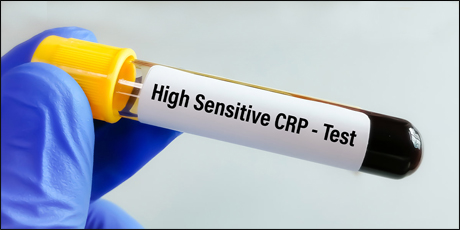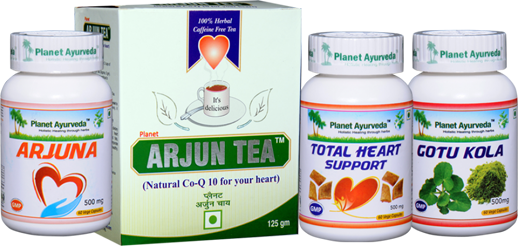Abstract
Heart diseases are rising worldwide, and most of the occurrence of heart condition is sudden, resulting in marked morbidity. What if we can have a prior view of the upcoming heart issues? In this regard, the High-Sensitivity C-Reactive Protein (hs-CRP) test is a pivotal diagnostic tool in modern medicine, offering insights into systemic inflammation and cardiovascular risk. Elevated hs-CRP levels are closely linked to an increased likelihood of heart diseases, including myocardial infarction and stroke. This article delves into the importance of the hs-CRP test, explores its implications, and highlights how Ayurveda can play a complementary role in managing heart health.

Introduction
C-Reactive Protein (CRP) is produced by the liver in response to inflammation. The hs-CRP test is a refined version that detects lower levels of CRP, making it a sensitive marker for chronic inflammation and a predictor of cardiovascular events. Elevated hs-CRP levels can indicate underlying issues even before symptoms manifest, emphasizing its role in preventive cardiology. So, it makes the test a well advanced measure to keep a check on the developing condition in the near future. Now let's have a look at causes behind the raised levels of hs-CRP. However, we shall discuss this in the context of heart conditions.
Causes of Elevated hs-CRP
Several factors can lead to increased hs-CRP levels:
- Chronic Infections : Persistent infections can trigger prolonged inflammatory responses.
- Heart conditions : Myocardial Infarction, Coronary Artery Disease, Atherosclerosis, Acute and Chronic Heart failure etc.
- Autoimmune Disorders : Conditions like rheumatoid arthritis elevate CRP levels.
- Obesity : Excess adipose tissue releases pro-inflammatory cytokines.
- Smoking : Tobacco use induces systemic inflammation.
Signs and Symptoms Associated with High hs-CRP
While hs-CRP itself doesn't cause symptoms, elevated levels often correlate with:
- Fatigue
- Chest Discomfort
- Shortness of Breath
- General Malaise
Management Strategies
To manage elevated hs-CRP levels:
1. Lifestyle Modifications
- Regular Exercise : Engage in at least 150 minutes of moderate aerobic activity weekly.
- Smoking Cessation : Eliminate tobacco use to reduce inflammation.
- Stress Management : Incorporate mindfulness and relaxation techniques.
2. Medical Management
Required other confirmatory tests before starting any medicines.
- Statins
- Anti-inflammatory Medications
Ayurveda's Role in Heart Health
In Ayurveda, Hridya Roga refers to a broad spectrum of heart disease. Heart being a vital organ is considered to be one of the trividh marma, that when injured that could result in immediate death. However, there are other causative factors that lead to the buildup of certain toxins/cholesterol levels in the arteries that could impact the blood supply to the heart. In Ayurveda, there are a number of causes that can lead to heart diseases such as excessive exercise, intake of spicy food, excessive purgation and enema, stress, fear, panic, buildup of ama dosha (toxins), usage of emaciated food and injury. This causative factor can result in inflammation in the parts of the heart. That can increase the values of the hs CRP. Ayurveda has mentioned five types of hrid roga ie vata, pitta, kapha, tridosha and krimij. All the symptoms according to the dosha guna and krimij have pricking and sharp pain and itching in the chest. Vataja has tearing pain, pitaja manifests with excessive thirst, excessive temperature, burning sensation, fatigue, loss of consciousness, excessive sweating and dry mouth. Kaphaj hrid roga shows heaviness and rigidity in the chest and heart region, anorexia, and a sweet taste in the mouth. Tridoshaja hrid roga has all the symptoms of the vataja, pittaja and kaphaja types. However, prevention, that is nidana parivarjan in Ayurveda, is best to avoid the manifestation of heart diseases. Following are some of the remedies that can help people with heart conditions.
Ayurveda, the ancient Indian system of medicine, emphasizes a holistic approach to health, focusing on balance and prevention. Below are some of the management protocols to prevent heart disease in wake of increased hs-CRP levels.
- Herbs that are effective in hridyaroga includes Arjuna, Pushkarmoola, Ashwagandha, and Turmeric are renowned for their cardioprotective properties.
- Dietary Guidelines: Emphasizing foods—fresh, light, and nourishing—to support heart function
- Lifestyle Practices: Incorporating Yoga, Pranayama, and Meditation to reduce stress and enhance cardiovascular health.
- Classical ayurvedic medicines include Hridrogahara kashyam, Pushkarahwadi kashyam, Punarnavadi taila, Haritakyadi ghrit, Pushkarmooladi churna, Trayushnadi ghrit, Pathyadi kalka, Drakshadya ghrita, Kasherukadi ghrita, Krishnadi churna, Arjunarisht etc
Herbal Remedies for Heart Disease by Planet Ayurveda
Planet Ayurveda is a reputable Ayurveda brand dedicated to providing authentic Ayurvedic formulations. It has a number of formulations in the form of powders, syrups, capsules, tablets, medicated ghee, juices etc. All the products of the company are in accordance with those mentioned in the classical texts of Ayurveda. Moreover, Planet Ayurveda has been helping with the patients with chronic illnesses. It is also mentionable that the products are devoid of any harsh chemicals and additives. Planet Ayurveda is pleased to present its ‘Heart Care Pack’ for the patients suffering from Heart Diseases. Heart Care Pack is specifically designed to support heart health. The products in the pack do not only take care of the manifested disorder but also prevent the disease from expressing itself.
Heart Care Pack Components
- Arjuna Capsules
- Arjun Tea
- Total Heart Support
- Gotu Kola Capsules
Product Description
1. Arjuna Capsules
Planet Ayurveda’s Arjuna capsules contain arjuna (Terminalia arjuna) bark extract. Arjuna is a powerful Ayurvedic herb known for its cardioprotective properties. It strengthens the heart muscle, improves circulation, and helps maintain healthy blood pressure. Being rich in antioxidants and coenzyme Q10-like compounds, Arjuna reduces oxidative stress and supports heart function. It aids in lowering cholesterol and triglyceride levels, helping to prevent plaque buildup in arteries. Arjuna also has mild diuretic and anti-inflammatory effects, easing cardiac workload. By balancing Pitta and Kapha doshas, it promotes emotional calm and reduces stress, both vital for heart health. Regular use of Arjuna supports overall cardiovascular strength and resilience naturally.
Dosage : One capsule twice daily with plain water, after meals.
2. Arjun Tea
Arjuna tea is a product of Planet Ayurveda, made from the bark of the arjuna (Terminalia arjuna) tree and is a natural remedy that supports heart health. It strengthens the cardiac muscles, improves blood circulation, and helps regulate blood pressure. The tea is rich in antioxidants, which protect the heart from oxidative stress and reduce inflammation in blood vessels. Arjuna tea also helps lower LDL (bad cholesterol) and triglycerides, reducing the risk of plaque buildup and atherosclerosis. Its calming effect on the nervous system reduces stress, a major trigger for heart disease. Drinking Arjuna tea regularly promotes overall cardiovascular wellness in a gentle and natural manner.
Dosage : One cup daily.
3. Total Heart Support
Planet Ayurveda’s Total Heart Support Capsules are a potent blend of time-tested Ayurvedic herbs that help maintain a healthy and strong heart. These capsules contain Arjuna (Terminalia arjuna), Ashwagandha (Withania somnifera), Brahmi (Bacopa monnieri), and Shankhpushpi (Convolvulus pluricaulis), which together support cardiac function, improve circulation, and reduce stress on the heart. Arjuna strengthens heart muscles and manages cholesterol levels, while Ashwagandha reduces stress and supports a balanced blood pressure. Brahmi and Shankhpushpi calm the nervous system, helping to manage anxiety and emotional strain that can affect heart health. The formula works holistically to protect against hypertension, arrhythmia, and other heart conditions. Total Heart Support offers a natural, side-effect-free way to promote long-term cardiovascular wellness and resilience.
Dosage : Two capsules twice daily with plain water, after meals.
4. Gotu Kola Capsules
Planet Ayurveda’s Gotu Kola Capsules offer a natural way to support heart health by promoting healthy circulation, reducing stress, and protecting blood vessels. Gotu Kola (Centella asiatica) is a renowned Ayurvedic herb that enhances blood flow, strengthens vein walls, and supports the integrity of capillaries and arteries. It is rich in antioxidants that help reduce inflammation and oxidative stress, both major contributors to heart disease. Additionally, Gotu Kola calms the nervous system, helping to manage stress and anxiety, which negatively impact heart function. By improving microcirculation and supporting mental clarity, these capsules offer a holistic cardiovascular benefit.
Dosage : One capsule twice daily with plain water, after meals.
Conclusion
The hs-CRP test serves as a crucial marker in identifying hidden inflammation and assessing cardiovascular risk. While modern medicine offers effective interventions, integrating Ayurvedic principles provides a holistic approach to heart health. Planet Ayurveda's Heart Care Pack embodies this integration, offering natural solutions rooted in ancient wisdom. By embracing a balanced lifestyle, nourishing diet, and time-tested herbal remedies, one can journey towards optimal heart health and overall well-being.




